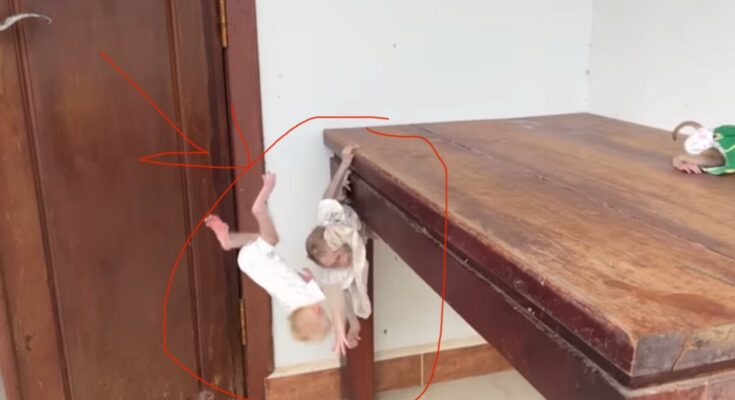In a quiet village on the edge of a forest reserve, a heartbreaking incident turned into a remarkable story of compassion and survival. A baby monkey, no more than a few weeks old, suffered a serious spinal injury after falling off a table at a local household where he and his mother had been regularly visiting for food. The tiny primate’s ordeal not only shed light on the dangers wildlife face in human-populated areas but also highlighted the importance of wildlife rescue and rehabilitation efforts.
According to local witnesses, the infant monkey had been part of a troop that frequently ventured into the village. They were known for their playful antics and were often seen climbing rooftops, raiding fruit baskets, or simply lounging on porches. On this particular day, the curious baby clambered onto a table while his mother was distracted nearby. In a split second, he slipped and fell, landing awkwardly on the hard ground.
At first, the villagers thought the fall had only startled him. But as minutes passed, it became clear something was wrong. The baby monkey couldn’t move his lower limbs and struggled to drag himself toward his mother, who watched helplessly.
Local animal welfare volunteers were alerted and responded swiftly. They gently secured the injured monkey and transported him to a nearby wildlife rehabilitation center. Initial assessments confirmed the worst: the monkey had sustained a spinal injury that impaired his mobility.
Dr. Rina Das, a veterinarian specializing in primate care at the wildlife hospital, explained the severity of the situation. “Spinal injuries in such young animals are extremely dangerous. They are still growing, and any trauma can have lifelong effects. But the earlier we intervene, the better the chances of some recovery.”
The baby monkey was stabilized, given anti-inflammatory medication, and underwent a series of X-rays and neurological evaluations. To everyone’s relief, the injury, while serious, had not completely severed his spinal cord. With proper care, he might regain some mobility.
Over the next few weeks, the hospital team worked tirelessly to support his recovery. He was placed in a small enclosure with soft bedding and received daily physical therapy. His tiny limbs were gently massaged, and exercises were introduced to stimulate muscle activity. Volunteers took turns feeding him milk and fruits, and even provided a small stuffed toy to mimic the comfort of his mother.
While it is still too early to tell if he will be able to return to the wild, the baby monkey—now named “Kavi” by the rescue team—is showing signs of improvement. He has regained partial movement in one leg and is learning to use his arms to stabilize himself.
Kavi’s story is a reminder of the delicate balance between human settlements and wildlife. It’s also a testament to what can happen when people choose compassion over indifference. Thanks to the swift action of locals and the dedication of rescuers, a small life was given another chance.



